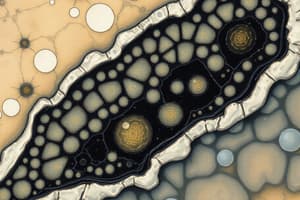Podcast
Questions and Answers
Define biology and explain its scope.
Define biology and explain its scope.
Biology is the scientific study of life. It is a natural science with a broad scope, encompassing the study of all living organisms and their interactions with the environment.
What are the unifying themes in biology?
What are the unifying themes in biology?
The unifying themes in biology include the cellular basis of life, heredity and gene expression, evolution, energy processing, and regulation of internal environments.
Explain the significance of cells in biology.
Explain the significance of cells in biology.
Cells are the basic structural and functional units of all living organisms. They process hereditary information encoded in genes, which can be transmitted to future generations.
How does evolution explain the unity and diversity of life?
How does evolution explain the unity and diversity of life?
Why is energy processing important to life?
Why is energy processing important to life?
What is human reproduction and how does it result in the production of a human offspring?
What is human reproduction and how does it result in the production of a human offspring?
What are gametes and how are they different from normal cells?
What are gametes and how are they different from normal cells?
What is the process of genetic recombination and when does it occur?
What is the process of genetic recombination and when does it occur?
What is human embryogenesis and when does it start?
What is human embryogenesis and when does it start?
How is the fertilization of the ovum achieved?
How is the fertilization of the ovum achieved?
Flashcards are hidden until you start studying




